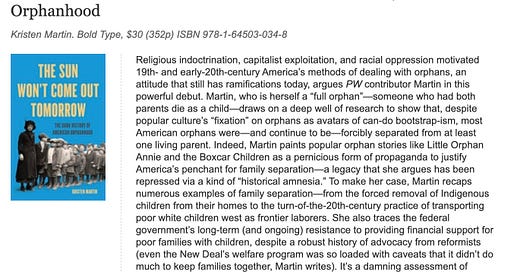Book Critic's First Review (of her own book)
On taking what I dish out, plus a new preorder deal and child welfare news roundup
I wrote my first published book review in 2005, when I was a sophomore in high school. The book was Curtis Sittenfeld’s Prep, which I purchased at the Borders across the street from Bridgewater Commons Mall (RIP) and discovered because it was 1) front-facing on a shelf featuring new fiction releases and 2) because the cover iconically features a hot pink and lime green webbed belt, and I wore webbed belts. To land the story, I convinced our school newspaper’s faculty adviser that this novel about a life at a New England boarding school was of interest to our Catholic school’s student body (he wasn’t a hard sell—he also let me review far less popular stuff like semi-local NJ emo band Socratic’s first LP Lunch for the Sky).
I threw away the resulting clip years ago when I cleaned out my room at my aunt Alice’s house, and the Internet Archive’s WayBack Machine failed to materialize the scanned copy on my high school’s website, so I’ll spare you an excerpt. But this is all to say that some nineteen years after I first wrote for a public audience about a book—and after about a decade of writing book criticism professionally—my own book received its first review this week!
Publishers Weekly calls The Sun Won’t Come Out tomorrow a “powerful debut” and “a damning assessment of America as a society built on the exploitation of children. Full review here and below:
It’s a wild and special thing to have my own work distilled and critiqued, even though I do the same thing to other writers’ work as part of my job, and perhaps especially because of that. I know all too well the dance between summary and evaluation, between discerning intent and judging execution. I also know how hard it is to choose which books to give attention when there are so very many books published each season—and when only a select few get a big investment from their publishers to garner that attention, as Maris Kreizman has written about so thoughtfully in newsletter. (My own in-house publicist is a dream and I am so thankful for her! Hi Brooke!) Early reviews from trade magazines like PW are really important for piquing the interest of booksellers and librarians and also critics like me—I often look to what PW and Kirkus are reviewing when I’m deciding what to pitch on myself.
I’ve been nervous about my book heading out into the hands of readers I don’t know. It’s one thing to receive blurbs from writers I hugely admire and who have agreed to provide quotes for the back cover to help the book succeed (hope to share these soon!). It’s an entirely different matter to be read and reviewed by an anonymous critic who only has a couple of sentences to make their case. To see the PW reviewer get at what I’m trying to do with The Sun Won’t Come Out Tomorrow—and to see them say that I’ve done it well—is extremely gratifying.
Perhaps that PW review has convinced you to preorder my book. Well, if you use code KRISTEN over at Tertulia now through November 5, you can get 25 percent off.
As with early reviews, preorders are hugely important—they help signal to the industry that people are jonesing for this little revisionist history. Tertulia is a cool spot to preorder from because they’re a coop online bookstore that runs on recommendations and conversations about books. If you’re into their deal and want to sign up for a trial membership, you can get the book for half off plus free shipping—no code required.
And now for some child welfare news links!
There have already been several big stories this fall, but arguably the biggest just happened on Friday, when President Joe Biden proffered a formal apology for the federal government’s role in running Indian boarding schools. This historic moment comes more than fifty years after the the government stopped funding such schools, and I’d argue that we would still be waiting for this apology were it not for the work of Deb Haaland, who as secretary of the interior has led a federal reckoning with the cultural genocide the boarding schools inflicted. Indian Country Today has a thorough recap, as well as reactions from Native peoples. Let’s hope this belated apology is but the first step in the United States takes in reconciliation and reparation with Indian country.
Another huge story broke last month, when China announced the termination of their international adoption program. This story from Barbara Demick for The New Yorker provides a look-back at the program, and on Instagram, Gretchen Sisson, sociologist and author of Relinquished, puts the news in the context of other big stories in international adoption. Gretchen also suggests further reading on the topic in her caption, including books by internationally adopted people.
Also in the international adoption vein, the Associated Press dropped a deeply necessary investigation on how thousands of people adopted internationally are in limbo because they lack U.S. citizenship.





